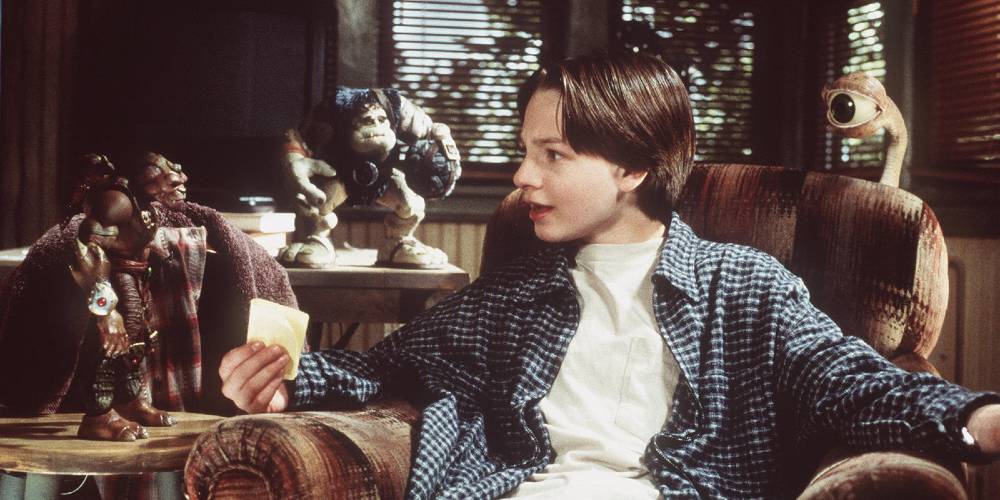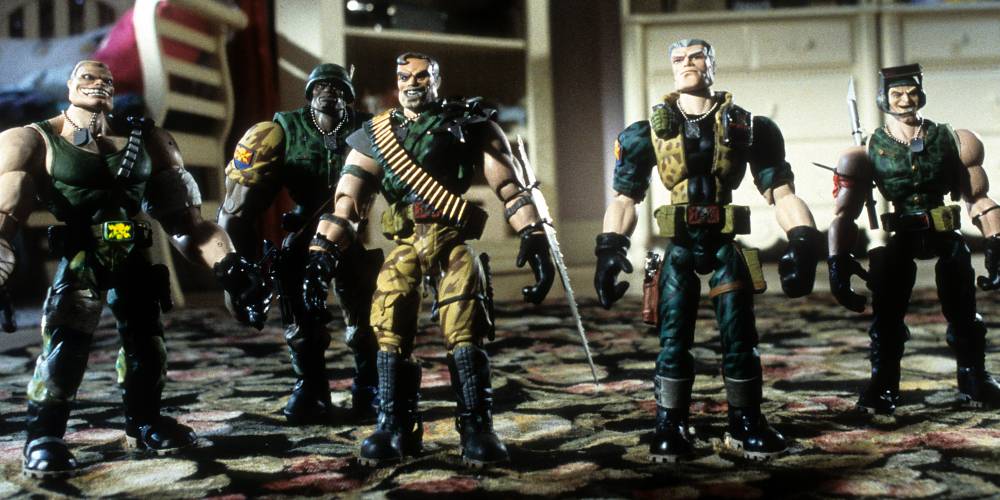Joe Dante’s 1998 teens n’ toy creatures v killer toy commandos flick boasts marvelous character and design work for its titular playthings, which in turn lead to thoughtful observations on toymaking.
What draws kids to toys? Cunning advertising? Colorful packaging? Creative capture of the zeitgeist? All of those play a role, certainly. But drawing a kid to a toy isn’t the same thing as keeping their attention. No, for a toy to take hold, to become something that kids love, something that’s real, what’s needed is care. There’s no one way for care to manifest—it can be everything from a long-running story whose telling breathes character into a broadly sketched world to a guiding design philosophy dedicated to helping kids grow. Amidst clever chaos, cutting satire, and creative effects work, Joe Dante‘s Small Soldiers—released in the US 25 years ago this week—proves a fun meditation on the necessity of care in crafting.
Dante and the Stan Winston Studio team build Small Soldiers‘ action on scale and the transmutation of the everyday into the ridiculous but dangerous. As vicious as Major Chip Hazard (Tommy Lee Jones) and his Commando Elite are, Dante and company never lose sight of the fact that physically, they’re toys. Plastic, metal, wires, and maybe 12 inches high at most. It’s one thing for them to menace the gentle Archer (Frank Langella) and his fellow Gorgonites. It’s another entirely for them to take on a human. For all of their hyper-macho certainty, simple pouncing does not get them very far. Thus, creativity is required.
Dante carries the gleefully anarchic spirit of his Gremlins into Small Soldiers via the Commandos’ efforts to counter the size factor, whether through upping their numbers via the Frankensteinian creation of silicon life or deploying an arsenal of remarkably brutal weaponry built from everyday household items. The Commando Elite are ridiculous, a down-to-the-casting-Dirty-Half-Dozen so overloaded with testosterone that even Marion Cobretti might find it a bit much. Their absurdity enhances the danger they pose to the Gorgonites and their human allies—if you can build one makeshift flamethrower, why not build multiple makeshift flamethrowers? After all, all Gorgonite scum (humans included) must die.
While the action is where Dante and company have the most fun with Small Soldiers, the friendship that develops between Archer and troubled teen Alan (Gregory Smith) is the most nteresting work in the film. It’s also home to the subtler side of Small Soldiers‘ argument for the necessity of care—in toymaking and in general.
Alan’s generally a sweet kid, but he’s lonely and chafes against his father (Kevin Dunn, Catch the Fair One)’s heavy-handed, untrusting parenting (though, in one of the script’s weaker [and decidedly pre-Columbine] moments, Alan’s past Rebellious Teen Antics leap from tagging and flooding toilets to a bomb threat. Even setting aside the ongoing gun violence epidemic, that’s both a massive jump in the scale of his actions and does not track with how Alan’s played by Smith and otherwise written—a strange, discordant note in the picture). Archer, despite being marketed as a cowardly nemesis to the Commandos, is similarly good-hearted, a searcher doing his best to look out for his fellows and find a way home.

By befriending Alan, Archer is able to follow his original programming—prior to being repurposed as the Commandos’ hated enemies, the Gorgonites were meant as “learning through play” toys—to learn about the world, both literally (in his going on an Encarta binge) and figuratively (learning to understand that the world exists beyond himself). This in turn enables him and his fellow Gorgonites to grow beyond their “cowardly foe” programming. By befriending Archer, Alan is able to mature and break out of the rut he opens Small Soldiers stuck in. He actively works to befriend and ask out his crush Christy (the great Kirsten Dunst, reliably good despite frustrating writing for her more-than-meets-the-eye teen girl). He proves his trustworthiness to his Dad. He connects and engages with the world beyond himself.
By contrast, for all their posturing (and an aggressive marketing campaign from their manufacturer) the Commando Elite are written as fatally flawed on a conceptual level. Beyond their cousin-to-Starship-Troopers military aesthetic, all they are is the Gorgonites’ enemy—and even that’s the result of a corporate-mandted combination of two toylines that were not meant to be connected. Where the Gorgonites can both literally learn and grow and—as evidenced by Alan—help others to do so, the Commandos can only regurgitate. While their homemade death machines are creative, they all boil down to “weapon.” While their battle strategies are cunning and dangerous, in practice they boil down to “throw more at the enemy.” Their one moment of sentiment—mourning a colleague fatally mauled by a garbage disposal—is undercut by Chip Hazard’s elegy degenerating into a pre-existing commercial catchphrase (Small Soldiers‘ voice work is strong throughout, but Jones is a particular hoot as the increasingly deranged Major) and their lack of individuality.

Where the Gorgonites are distinct and lovable (minus some grating jokes about contemporary pop culture, but that’s a matter of personal taste), the Commando Elite are a murderous blob—developments that tie directly back to the care and lack thereof with which they were crafted, amplified by Small Soldiers‘ fantastic learning-capable AI computer chips. As Robert Picardo puts it: “They can learn within the boundaries of their primary programming. Whatever the core programming, the X 1000 enhances it from within. So if you’ve got a problem, it’s in your software.”
Most failed toys don’t turn literally murderous and lead armies to massacre their enemies, but many do share the Commandos sloppy, careless design—whether actively dangerous or just pain boring. Conversely, many toys that have caught on and endured are made with care that’s cousin to the Gorgonites’ crafting. Care matters in toymaking. Small Soldiers, all together a solidly good—if uneven—picture, shines in making that argument. Langella and Jones’ excellent voice work, the Stan Winston Studio team’s gorgeous effects, and Dante’s gleefully chaotic action aequences come together to build the case. For my money, they succeed, and admirably.
Read next: The Spool's Best New Releases
Streaming guides
The Best Live TV Streaming Services With Free Trial
The praises of live TV streaming services don’t need to be further sung. By now, we all know that compared to clunky, commitment-heavy cable, live TV is cheaper and much easier to manage. But just in case you’re still on the fence about jumping over to the other side, or if you’re just unhappy with ... The Best Live TV Streaming Services With Free Trial
How to Watch Power Book III: Raising Kanan Season 3
Season 3 of the hotly anticipated Power spin-off, Power Book III: Raising Kanan, is arriving on Starz soon, so you know what that means: it’s the ’90s again in The Southside, and we’re back with the Thomas family as they navigate the ins and outs of the criminal underworld they’re helping build. Mekai Curtis is ... How to Watch Power Book III: Raising Kanan Season 3
How to Watch Doctor Who: 60th Anniversary Specials
Ladies and gentlemen, we’re so back! To celebrate Doctor Who’s 60th anniversary, the BBC is producing a three-episode special starring none other than the Tenth/Fourteenth Doctor himself, David Tennant. And to the supreme delight of fans (that would be me, dear reader), the Doctor will be joined by old-time companion Donna Noble (Catherine Tate) and ... How to Watch Doctor Who: 60th Anniversary Specials
Which Netflix Country has Interstellar?
Maybe you’ve just seen Oppenheimer and have the strongest urge to marathon—or more fun yet, rank!—all of Christopher Nolan’s films. Or maybe you’re one of the few who haven’t seen Interstellar yet. If you are, then you should change that immediately; the dystopian epic is one of Nolan’s best, and with that incredible twist in ... Which Netflix Country has Interstellar?
Which Netflix Country Has Each Movie of The Hunger Games?
For whatever reason, The Hunger Games series isn’t available in the same countries around the world. You’ll find the first and second (aka the best) installments in Hong Kong, for instance, but not the third and fourth. It’s a frustrating dilemma, especially if you don’t even have a single entry in your region, which is ... Which Netflix Country Has Each Movie of The Hunger Games?
How to Watch ESPN With A Free Trial
One of the major concerns people have before cutting the cord is potentially losing access to live sports. But the great thing about live TV streaming services is that you never lose that access. Minus the contracts and complications of cable, these streaming services connect you to a host of live channels, including ESPN. So ... How to Watch ESPN With A Free Trial
How to Watch Paramount Network With a Free Trial
To date, Paramount Network has only two original shows on air right now: Yellowstone and Bar Rescue. The network seems to have its hands full with on-demand streaming service Paramount+, which is constantly stacked with a fresh supply of new shows. But Yellowstone and Bar Rescue are so sturdy and expansive that the network doesn’t ... How to Watch Paramount Network With a Free Trial
How to Watch WE TV With a Free Trial
Previously “Women’s Entertainment,” We TV has since rebranded to accurately reflect its name and be a more inclusive lifestyle channel. It’s home to addictive reality gems like Bold and Bougie, Bridezillas, Marriage Boot Camp, and The Untold Stories of Hip Hop. And when it’s not airing original titles, it has on syndicated shows like 9-1-1, ... How to Watch WE TV With a Free Trial
How to Watch TNT Sports With A Free Trial
For many sports fans, TNT is a non-negotiable. It broadcasts NBA, MLB, NHL, college basketball, and All Elite Wrestling matches. And, as a bonus, it also has reruns of shows like Supernatural, Charmed, and NCIS, as well as films like The Avengers, Dune, and Justice League. But while TNT used to be a cable staple, ... How to Watch TNT Sports With A Free Trial
How to Watch Comedy Central With a Free Trial
It’s no coincidence that many of today’s biggest comedians found their footing on Comedy Central: the channel is a bastion of emerging comic talents. It served as a playground for people like Nathan Fielder (Fielder For You), Ilana Glazer and Abbi Jacobson (Broad City), Tim Robinson (Detroiters), and Dave Chappelle (Chappelle’s Show) before they shot ... How to Watch Comedy Central With a Free Trial
How to Watch FX With a Free Trial
You’d be hard-pressed to find a bad show airing on FX. The channel has made a name for itself as a bastion of high-brow TV, along with HBO and AMC. It’s produced shows like Atlanta, Fargo, The Americans, Archer, and more recently, Shogun. But because it’s owned by Disney, it still airs several blockbusters in ... How to Watch FX With a Free Trial